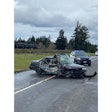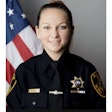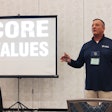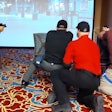Some things are beyond our control and some questions are better left unanswered.
I have never been to Syosset. Except for the occasional story about a bad storm or boating accident, Syosset has never really impacted my life.
But the front page of a recent edition of the New York Post changed that. It told the story of a young man, all of nineteen, despondent over a $6,000 debt from bad bets, who had made a decision. After leaving notes for his friends, he penned a final one and addressed it to a person he had never met and would never know. He then bought himself a child's Wild West sheriff's rig, complete with plastic badge, plastic holster, and full-sized, very real-looking gun.
This young man then went out driving-erratically, dangerously-looking to force a confrontation.
The two officers who pulled the young man over, must have thought they were making just another stop out of thousands. But this one was different. The 19-year-old exited his car and charged towards the officers, brandishing the toy gun.
Anyone with over 20 minutes of time on the job can imagine the momentary disbelief, the startle reflex. But the real kicker, in this case, was the final note-addressed: "To the cop who shot me."
I once attended an FBI class on Critical Incident Negotiations which touched on "suicide by cop" and showed videos of different actual cases where people had made the conscious decision to die at the hands of law enforcement. It all seemed fairly learnable, information that was impressive but not overwhelming. That was before Aug. 3, 1997.
Having switched shifts as a favor to another officer, I was working with a different squad than my usual crew. I was the primary car responding to a husband-wife domestic, possibly turning violent. I could see a couple outside on the lawn, standing very close. A few neighbors stood in doorways, watching. I pulled into the parking lot, radioed that I was out, and started toward the couple.
When the wife saw me coming she turned and ran toward me. My unobstructed view of the husband now revealed the 10-inch knife that he was holding to his own throat and the blood stains on his shirts where he had been sticking on himself. I remember grabbing the wife and shoving her behind me, pulling my radio and gun at the same time as the man began advancing toward me.
I called in for assistance and drew down on the man, ordering him to stop and put the knife down. He told me, "You. Kill me. I'm going to cut my own throat anyway." And on he came.
When I reviewed the incident with the sergeant I told him that the only reason I didn't shoot this man as he followed me and his estranged wife through the parking lot, was the fact that I felt I still had some control over the situation. I had my weapon out and ready, distance and available cover, backup within seconds, and I felt competent in my abilities.
When he finally threw the knife down and tried to run after his wife, I had him cuffed and sniffing asphalt within seconds. But, I don't think he saw the shake in my hands. I know he couldn't read the thoughts that were racing through my head: What boss is on call? If I shoot this guy, will I be here all night, writing reports and worrying about my family? Will I be sanctified or crucified? Lauded or lambasted? What about the 21-foot rule? My background, in case I do shoot? Can I just shoot him in the hip and disable him rather than let a .45 Hydra-shok round dissemble him? Geez, I wish I could call a time out.
For me, the situation ended there, with those thoughts lingering, the questions unanswered. But back in Syosset, two brother officers are forced to come to grips with their own questions. And the fact that control of the situation has been taken from the m the day before the actual incident. And while the note to "The cop who shot me" went to great lengths to reassure that the cops had been used and even apologized the officers involved, I don't think that will help a great deal when these two guys have to lie down for the night and pray for eight hours of dreamless sleep.
Mark Civita is a police officer from Spring Valley Police Department, Rockland County, New York









